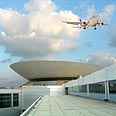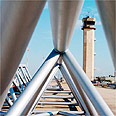
Ben Gurion Airport Terminal 3
Photo: Amnon Trablesi

BG control tower
Photo: Shalom Bar Tal
Major disasters in Israel's main airport are prevented on a daily basis only by luck and improvisation, a report by the Transportation Ministry revealed.
Disaster Averted
Iberia Airlines, El Al passenger planes approach runway simultaneously. Both pilots veer away at last second, averting disaster
The report, composed by a committee headed by the ministry's chief accident investigator Yitzhak Raz, examining a near collision between Iberia and El Al passenger flights at Ben Gurion airport one month ago, uncovered a series of systematic failures.
Air traffic controllers do not undergo periodic ability tests, and despite Ben Gurion's high traffic frequency, the controllers, who are forced to work grueling 12-hour shifts, are not trained to work under stressful conditions.
In the report, Raz recommended the supervisors undergo suitable training, are tested every year or two, and have their shifts cut back to 8-hours long.
Despite the fact that the new international terminal was opened over three years ago in a slightly different location, the old control tower remained in its place, giving the controllers a limited field of vision of what takes place in the air and on land.
Raz recommended building a new control tower or at least expanding its upper level.
Confusion is caused among aircrafts waiting to land as there are no agreed-upon instructions given to pilots.
Raz demanded that aircrafts be cleared off the runway as soon as possible after landing, in order to make way for more landings.
Unlike more advanced airports around the world, Ben Gurion does not have the Instrument Landing System which provides precise guidance to an aircraft approaching any runway.
The Israel Airports Authority claims that the mountains east of the airport would disturb the system's performance, and therefore pilots are forced to rely solely on their own eyes and instructions received from the supervisors.
Raz stated that a limited ranging navigations system could be installed and would not be affected by the mountainous terrain. "Even a partial system would improve safety," he said.
Relying too much on luck
In light of the report's findings, Transportation Minister Shaul Mofaz has appointed a public committee to examine air-space safety in Israel. "If we don’t work to fix the situation we will be facing a flight disaster," he warned.The committee has already received some criticism from aviation experts, "It's already obvious what needs to be done to prevent an accident. This is just another unnecessary committee and its conclusions will be filed and not implemented," said one of the experts.
Heading the committee is former IAF commander Amos Lapidot who has already composed recommendations for preventing an aviation disaster in the past.
However, none of the recommendations made in his 1991 report were implemented, and the books containing them were found in a Ben Gurion warehouse and thrown away.
"This is what will happen with the new report," said an aviation expert.
"In Israel's air space they rely too much on luck and not enough on procedures and up-to-date navigation equipment," the expert added.















